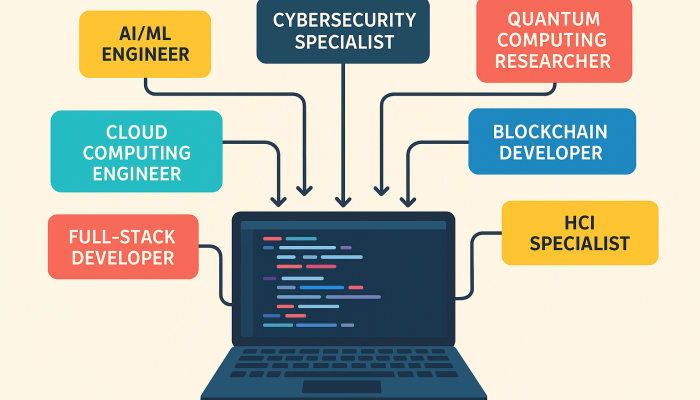Education has evolved and progressed alongside technology, solving many of the problems and inefficiencies that have long been associated with academia. One of the most controversial elements of traditional education has often been student evaluation and assessment, largely because students far outnumber staff and manual marking methods can involve human error.
However, online degrees eradicate this problem. AI-powered technology is used to make the evaluation process seamless, personal, and reliable. For those who are considering an online degree and are curious about how students are evaluated, we’ve put together this comprehensive guide so you know exactly what to expect.
1. Online exams and quizzes
Exams and quizzes are traditional forms of assessment that have been used for many types of degrees for decades. Online degrees are no exception to this, and they’ve even made the process more efficient.
From eradicating exam anxiety to shortening the wait time for results, online exams and quizzes are a much more convenient tool for measuring student progress. Non-graded online quizzes can also be used to get a better idea of a student’s strengths and weaknesses, assuring their degree is more tailored to their needs.
2. Essays
Essays and long-form papers are used in a variety of degrees so students can demonstrate their understanding of a subject. Students can expect these assessments to also be included in their online degrees, especially if they are studying humanities. The task may begin with a prompt or open-ended question that invites the student to engage their critical-thinking skills and known literature.
3. Online activities
One of the great things about learning via the internet is that it incorporates technology. Many of the activities featured in an online degree encourage the student to learn interactively, dragging and dropping their answers to questions and solutions to problems.
4. Lectures and seminars
Some students may worry that an online degree will be impersonal and lack some of the key factors involved in a more traditional education. However, lectures and seminars are still a part of online learning – they’re just done via video link.
Lectures can be viewed at any time, allowing students to better fit study around their daily life, while seminars allow students to engage in group discussions, ask questions, and provide feedback. Some courses even make it possible for students to have one-on-one video calls with lecturers, which can be especially helpful for students who require mentoring and additional instruction.
5. Practical simulations
Many degrees can involve practical activities and assessments for students to become fully qualified. However, many of these practical activities can be done with an online simulator. This practice is so effective that it has even been taken up by well-known brick-and-mortar institutions. The simulations take place online and allow students to show exactly how they would deal with a real-life situation.
For example, an online master’s of computer science might involve a software development simulation, while a marketing degree could involve a customer service dialogue simulator.
6. Polls
Polls are a quick and easy online tool that can be used for a plethora of evaluations during an online degree, from opinion-focused questions to student feedback after a lecture. The process is simple: a question is posed to the student along with several clickable options. The answers are then instantly collated and updated, allowing students to see which answers have been the most popular with their peers. This tool is also valuable for those running the course as it can be used to grab student attention quickly at the start of a session or to see how students have been finding a module so far.
7. Games
Most traditional degrees will only provide students with exams and quizzes on a formal and graded basis. However, when the pressure is off, casual quizzes and games can be an incredibly effective way for students to learn facts and theories.
Online degrees use computer-based software to develop fun and interactive games that improve a student’s knowledge and problem-solving abilities. Each session or module can end in a quick activity that tests how well students absorbed the information while also helping them refresh their memory.
8. Peer evaluation
Another innovative way that online degrees might choose to evaluate student progress is by peer review. This method allows students to review and evaluate each other’s work, helping them reflect on their learning and improve their own work in the process.
9. Forums
Forums are an integral part of internet culture, allowing individuals to share their opinions on certain subjects and engage in insightful discussion. Not only can forums be used as a discussion tool for students enrolled in an online degree, but they can also be used as part of the evaluation process.
If students are required to contribute to a forum as part of their course, evaluators can read their posts and discussions to keep track of their comprehension of a topic. This method is even more effective when lecturers and course leaders are involved in the forum discussions.
10. Online assessment tools
Hundreds of assessment tools are available online that are designed to make the evaluation process quicker, easier and more effective. Some of these tools can be used for video evaluation, where a student uses their computer’s webcam to demonstrate their skill competency, while other tools are used for collaboration, well-being assessments, and helping students better fit their studies around life.
Takeaways
Knowing the different ways students are evaluated for an online degree can help you understand what to expect from e-learning. Technology is ever-expanding, and online degrees continue to incorporate the latest tools designed to improve the student experience.
The evaluation methods on this list don’t just help measure student progress; they also make the learning process more efficient, improve communication skills, and assess student well-being. All of these methods can also be used to tailor the course to suit an individual’s specific strengths and weaknesses.
For anyone who is concerned that an online degree will lack the personal touch of a traditional institution, this list should put your mind at ease.




